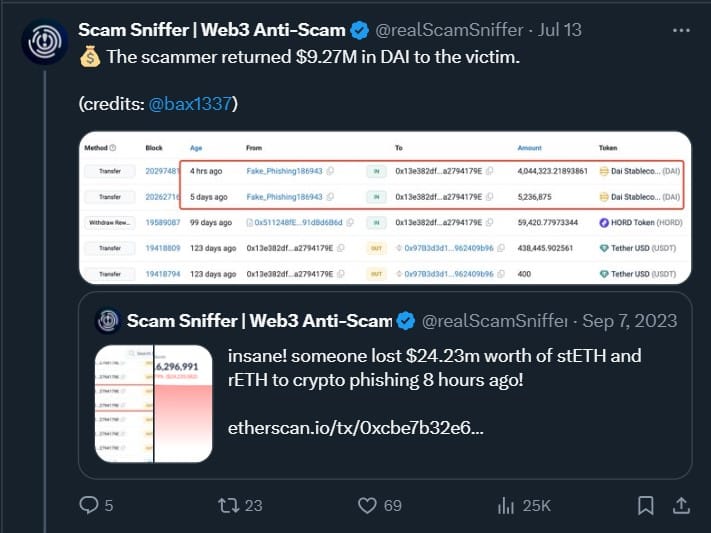News
Crypto conscience? Scammer returns $9.3M stablecoins after 10 months
A phishing scammer returns $9.3 million of $24 million in stolen crypto.

- A scammer returned $9.3 million out of $24 million in stolen stablecoins after 10 months.
- Returned funds represent 38.26% of the original theft.
In a surprising turn of events, a scammer has returned $9.3 million in DAI stablecoins to their victim. The crypto community is buzzing with speculation about the scammer’s motives and the implications for future security practices.
The scam and the unexpected refund
Last September, a phishing attack led to the theft of approximately $24.2 million in various crypto assets, including Lido Stacked Ether (stETH) and Rocket Pool (rETH).
This scam event was witch-blown by ScamSniffer back in September of last year when he tweeted,
“insane! someone lost $24.23m worth of stETH and rETH to crypto phishing 8 hours ago!”
The same crypto anti-scam analyst tweeted on the13th of July that the scanner had returned $9.27 million in DAI to the victim.

Source: x
This partial return comes nearly 10 months after a victim fell for a $24.2 million phishing scam in 2023.This theft left the victim with 9,579 Lido Staked Ether (stETH) and 4,850 Rocket Pool (rETH) tokens.
The victim fell into a common trap where scammers impersonate trusted entities. However, in an unexpected twist, the scammer returned 38.26% of the stolen funds in two separate transactions last week.
Decoding the scammer’s motives
The reason behind this partial repayment remains a mystery in the crypto community. Speculation theories range from a guilty conscience to a fear of impending capture.
This rare act of restitution has caught the crypto world off guard, as victims of such scams rarely recover their lost assets.
While the partial return of funds in stablecoins is positive for the victim, it does not negate the risks associated with phishing scams.
The incident serves as a reminder of the unpredictable nature of the digital asset landscape and the ongoing need for robust security measures.

